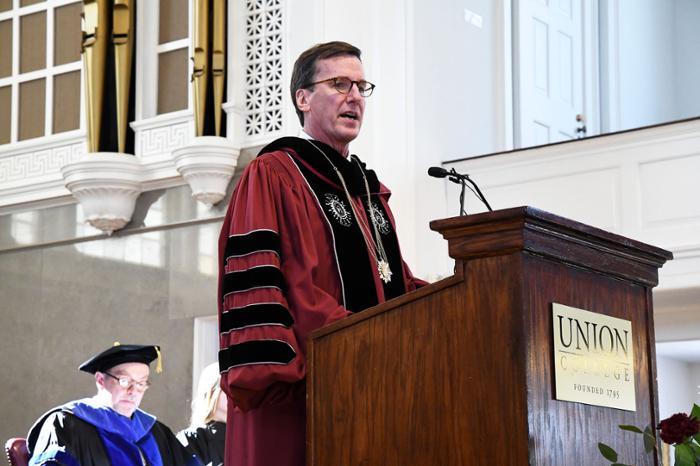In February 1795, the state Board of Regents granted its first charter to establish a college in Schenectady, bypassing the favored choice of Albany. The news touched off a celebration that spilled into the frontier town’s streets.
On Thursday, the campus community gathered in Memorial Chapel for Founders Day to celebrate the 222nd anniversary of the College’s charter. It was also an occasion to celebrate another milestone: the 200th anniversary of Union’s Phi Beta Kappa chapter, Alpha of New York.
“Founders Day provides us with an opportunity to revisit Union’s history and important themes that flow from our mission and institutional
identity,” President Stephen C. Ainlay told the audience.
He noted the College’s storied relationship with one of the nation’s most prestigious academic honor societies, whose mission is to champion education in the liberal arts and sciences, foster freedom of thought, and recognize academic excellence.
Established May 1, 1817, Union’s chapter is the fifth oldest in the country. Ainlay recalled how 25 people were inducted in the first few days of the chapter’s creation, including George Washington Doane, Class of 1818, whose portrait by renowned artist Henry Inman hangs in the President’s House. Doane was an accomplished hymnologist and wrote hymns popular in his day. He also became the Episcopalian Bishop of New Jersey.
“Other remarkable individuals were inducted in the early days of the chapter – people like William Seward (1820), Lincoln’s Secretary of State, and Henry Philip Tappan (1825), first president of the University of Michigan and often cited as the architect of the modern research university,” Ainlay said.
There are more than 1,300 living alumni in the chapter, and 53 faculty and administrators and four students in the Class of 2017 are members of Phi Beta Kappa at Union.
Ainlay encouraged the audience to visit the exhibit, “Friendship, Morality and Literature: Celebrating 200 years of Phi Beta Kappa at Union College,” on display in Beuth Atrium in Schaffer Library.
The keynote speaker was Frederick M. Lawrence, secretary and CEO of the Phi Beta Kappa Society. A former president of Brandeis University, Lawrence is a leading expert on civil rights, freedom of expression and bias crimes.
In the context of the national debate over free speech taking place following a divisive election and controversial campus protests, Lawrence acknowledged the tension that exists over how to pursue liberal, rational, open learning while at the same time celebrating a spirit of the academic community.
“We find ourselves today in uncharted waters indeed, and choppy ones at that,” Lawrence said. “It is the love of learning that will be our helm as we find our way.”
Citing a series of examples that he experienced over the past two decades, Lawrence presented a thoughtful, passionate overview of the tension that exists over First Amendment rights and the boundaries of free speech that border on harassment, intimidation and discrimination.
In one, he recalled the recent deaths of two police officers that occurred after a series of shooting incidents involving unarmed black men. A student leader of the Black Lives Matter movement, in a tweet that went viral, said that she had no sympathy for the police officers.
As president of the university, Lawrence felt pressure from both sides, those that wanted him to expel her or rescind her scholarship, and those who wanted him to issue a statement in support of free speech.
Lawrence opted for a slightly different response. He chose not to punish her, arguing her comments were protected under free speech. But he also emphatically rejected her views, calling them offensive and abhorrent, and urged others to do the same.
As campuses continue to be put to the test as they navigate the choppy waters in which they find themselves, Lawrence shared with the audience his three rules for what he calls vigorous civility.
“First, we can disagree with each other without delegitimizing,” he said. “Second, we can question each other’s opinions without questioning each other’s motives. And third, and perhaps most important, every conversation, no matter how controversial, should begin with a robust search for common ground.”
Also at Founders Day, Mark W. Potter, a religious studies teacher at Newton Country Day School of the Sacred Heart in Newton, Mass., was presented with the Gideon Hawley Teacher Recognition Award. Named for the 1809 graduate of Union who was New York State’s first superintendent of public education, the award is given to secondary school teachers who have had a continuing influence on the academic life of Union students. Potter was nominated by Katharine Beal ’20, a biology major.
The ceremony also featured the Union College Choir, under the direction of Professor of Music and College organist Dianne McMullen, performing Sancta Maria, Mater Dei, K. 273 by Wolfgang Amadeus Mozart.
The celebration opened with remarks from William A. Finlay, College marshal and chair of the Theater and Dance Department; David L. Henle ’75, vice chair of the College’s Board of Trustees; Peter Bedford, the John and Jane Wold Professor of Religious Studies and chair of the Faculty Executive Committee; and Audrey Hunt ’17, president of Student Forum.
The hour-long ceremony concluded with Ode to Old Union, led on organ by McMullen.
